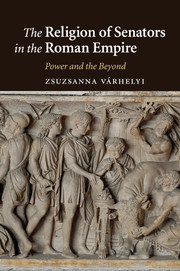1 - The new senate of the empire and religion
Published online by Cambridge University Press: 06 July 2010
Summary
It is undeniable that the senate lost much of its earlier political power with the coming of the new order introduced by the first emperor, Augustus. As Tacitus, one of the transformation's most acute observers, put it, the ruler “drew to himself the functions of the senate, the magistrates and the laws.”1 In two reviews of the senatorial roll, in 29 and 18 bce, even the senators' numbers were reduced, and the membership of many was challenged. It is, therefore, not surprising that modern scholarship on the imperial senate depicts an outdated, dying institution. In fact, from a social-historical perspective, there is good reason to doubt the usefulness of the senate as a distinct category for analysis, given that the sociological boundaries of the ordo diverged from those of the functional governing elite in imperial society:2 in addition to the ruler himself, others − such as members of the imperial family, influential freedmen, and rising knights − could affect Roman policy in a way once reserved exclusively for senators. Further, many aspects of what still distinguished senators from people of lower social status were now under the direct influence of the emperor. The newly established requirements for wealth, at a million sesterces for senators, could be satisfied by the emperors' financial grants to those without sufficient funds, unless, of course, the ruler preferred expelling a senator from the order or not letting him in.
- Type
- Chapter
- Information
- The Religion of Senators in the Roman EmpirePower and the Beyond, pp. 23 - 55Publisher: Cambridge University PressPrint publication year: 2010



